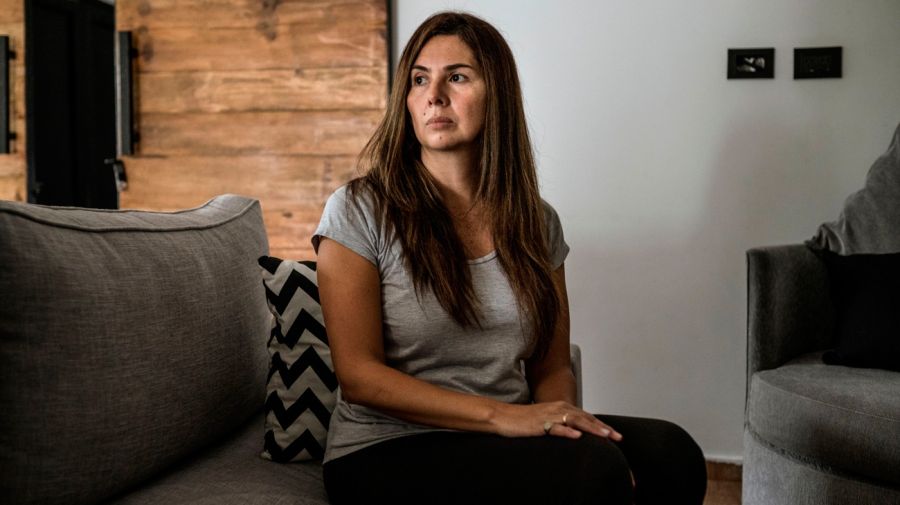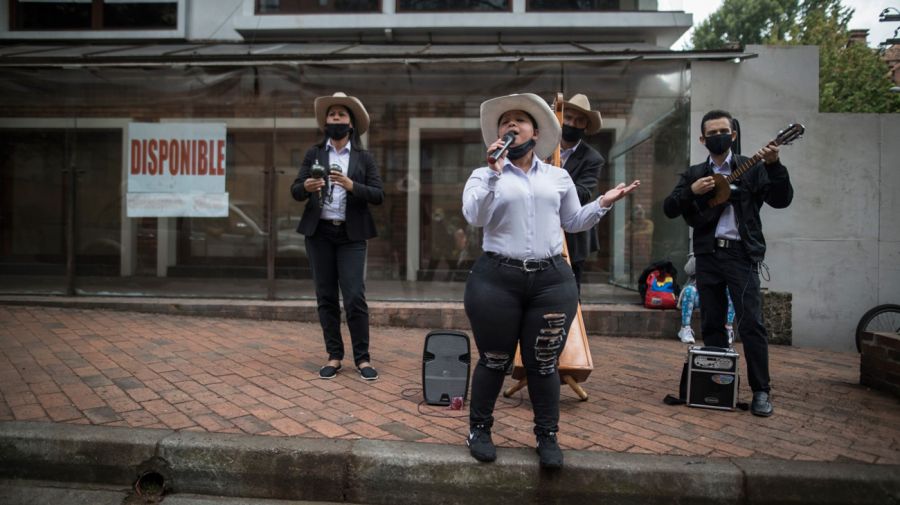The Covid-19 pandemic has sent a wave of poverty racing across Latin America, deepening declines that began over the past decade and consigning millions to lives of deprivation.
The world’s most unequal region saw 22 million people — the equivalent of everyone in New York state — join the ranks of the poor from 2019 to 2020, unable to meet basic needs. In all, about one-third of Latin America’s roughly 600 million residents live in poverty or what the United Nations defines as extreme poverty: subsisting on less than US$1.90 a day.
Short of vaccines and hospital beds, Latin America has been uniquely hard-hit due to the intensity of the pandemic and the steepness of its recession, the worst in two centuries. The region accounts for about 30 percent of the world’s Covid-19 deaths, despite having only eight percent of its population. Its economy contracted seven percent last year, more than double the decline of any other region.
The crisis is warping societies in ways large and small. A massive Rio de Janeiro library and cultural complex has become a riotous, besieged soup kitchen. In Bogotá, idled musicians serenade the rich, who toss them bags containing small bills with a coin or two for ballast as they fall from the balconies of luxurious apartments. In Mexico City, even attorneys are resorting to pawnshops.
Workers who had attained a tenuous stability are finding themselves jobless. People who labour in the vast informal sector are finding traditional networks of casual employment disrupted. For the unluckiest, life has been reduced to a constant search for food.
In Mexico City’s Calle Monte de Piedad, lawyer Juliana Ortega Aguilar, 36, waited outside the charity that gives the street its name. The centuries-old institution was founded to give the poor affordable loans. Inside, Ortega’s mother was pawning jewelry; the legal office where her husband works closed amid the pandemic. Ortega said few cases were arriving on her own desk.
“We’re a house full of lawyers, but there’s no work,” Ortega said. “We all have to pay rent or a mortgage, the electric bill and even if the kids aren’t going to school, they have to eat, and they get sick.”
Across the region, people who reached the middle-class life are trying to cling to it.
After years of renting in La Plata, Argentina, Romina Bravo, 44, and her husband in 2017 bought a three-bedroom house where seven-year-old Benicio and Valentino, 14, could grow up. They signed up for a government-promoted mortgage with payments tied to inflation, which was supposed to go down.
Instead, it soared, because of a lack of confidence in the peso and a failure of government price controls. Bravo lost her bank job of 22 years right before the pandemic, and her new position as a court administrator pays the equivalent of about US$320 a month, a fraction of her previous salary. A mortgage payment freeze just expired. Bravo put the house on sale in March.
“It’s either I eat or I pay,” said Bravo. “I’m hoping for help. Otherwise, I’ll be the next one evicted.”

(Bloomberg/Sarah Pabst)
Latin America had made strides in recent decades. By 2019, half its college-age population was enrolled in some form of higher education, up from 23 percent in 2000, according to UNESCO. The middle class expanded to 46 million households in 2018, up from 33 million a decade before, Euromonitor estimated.
Many countries finally stamped out runaway inflation. Stable policies and currencies paved the way for foreign investment and job growth. Brazil hosted the Olympics; Argentina held the G20 Summit; Facebook chief executive officer Mark Zuckerberg chose Colombia for his first international town hall.
The region’s single dominant economic driver has historically been exports of raw commodities like soy, beef and metals. China’s demand for those materials, a catalyst for growth in the 2000s, is surging again, causing prices to spike and giving policy-makers hope for growth. But governments remain heavily indebted — Argentina, Ecuador, Suriname and Belize all restructured their sovereign debt amid the pandemic — and few have money for social spending that could keep citizens afloat.
Glitzy events are now gone, violence is increasing, especially against women, and progress is unravelling. The region lost over 34 million jobs during the pandemic and workers saw more hours cut than in any other region, according to the International Labour Organisation. Instead of reaping the economic reward of higher commodity prices, the poor often experience them as soaring food costs. Millions of Venezuelans, fleeing a broken, mismanaged country, have spread across the region, adding acute challenges.
The public’s anger is spreading: Faced with its worst contraction on record, Colombia is trying to rein in its budget deficit and stave off credit-rating downgrades that could send borrowing costs soaring. This week, the government shelved a plan to raise taxes after deadly street protests.
“It really is bad news all around. Unless there’s some serious changes in the structures of social protection in the region, the outlook isn’t promising,” said Santiago Levy, a former top Mexican official who is a senior fellow at the Brookings Institution in Washington. “There’s going to be a long-term loss of human capital.”
In Mexico City, the pawnshops are filled with artifacts of a better life. People — most of whom never redeem their collateral — have left engraved gold wedding rings, refrigerators and washing machines. On a recent visit, those in the city’s historic center offered videogame consoles, GoPro-style cameras, hair straighteners and blood-pressure machines. One employee said she had even accepted a gold flask with a tiny spoon that looked like it was designed for cocaine.
“The middle class is no longer the middle class,” said Erika Guarneros, who buys and sells gold from her family’s stall. “It’s basically turned into the class of the poor.”
Many Latin American governments provide social welfare for those out of formal employment. At the same time, they increasingly concentrate taxes on companies and rich citizens to finance that spending. Researchers warn of a scenario where companies hire less, productivity falls and high-skill workers simply leave or seek jobs off the books to dodge taxes. Ultimately, governments lose revenue even as demand for aid soars.
“It’s a vicious circle,” says Agustin Salvia, research director at the Argentine Social Debt Observatory at the Catholic University of Argentina (UCA) in Buenos Aires. “The trend is eventually an economic paralysis in terms of job creation, productivity and informal-sector salaries that are poorer.”
The informal sector accounts for at least half the region’s workforce, with people catching jobs where they can, often for cash. The crisis has disrupted traditional labour markets.

(Ivan Valencia/Bloomberg)
In Bogotá, musicians for years used business cards and word of mouth to find steady work, and one could hire mariachi troupes directly off the streets. But since the pandemic stopped weddings and quinceaneras, wealthy neighborhoods have been filled with wandering musicians playing everything from folk tunes to opera. The trade of “balconeo,” or singing up at balconies, didn’t exist 18 months ago, said Enrique Gutiérrez, who plays a small guitar known as a cuatro.
“We sincerely hope we aren’t disturbing you,” Maryoris Cordero, the singer in his group, told the empty windows of one high-end apartment block, speaking through a small amplifier. The twanging of a harp rippled through the neighborhood as they struck up llanero songs from the cattle-grazing plains.
After six hours of walking and playing, each of the group’s four members typically takes home about US$7.
Workers aren’t the only ones displaced when such labour markets collapse. Harpist Elio Materan, who is married to maracas player Karla Rivero, said their nine-year-old daughter, Karlieth, is shackled to their schedule.
“She almost always goes with us, because we don’t have anyone to leave her with,” Materan said. “When she has virtual classes, she stays with her mom, and I go out with the other band members.”
The likelihood of a disadvantaged Latin American child graduating high school plunged an estimated 20 percentage points last year, the lowest level since the 1960s, according to Tulane University professor Nora Lustig. Meanwhile, graduation rates for rich kids barely budged.
“It’s a huge shock that could turn into a lasting scar,” said Lustig. Income recovers with economic growth, she said. “Human capital damage doesn’t.”
Nowhere is the replacement of aspiration by desperation more literal than at Rio de Janeiro’s Biblioteca Parque Estadual, the hub of a state library network where thousands came for books before the pandemic. Now, it accommodates a massive feeding operation.
Nearly 19 million Brazilians have gone hungry over the past year, according to food-security researchers. That’s almost double the amount the government says were in that situation in 2018. At first, emergency payments helped many stay fed. But aid was drastically reduced — and stopped altogether in the first three months of this year — as President Jair Bolsonaro struggles with a deepening fiscal crisis.
In Rio, the state’s human-rights agency gives out about 4,500 meals daily and runs the library site. The city’s neediest — the homeless, elderly, sex workers, mentally ill, and the out-of-work — crowd behind metal barriers before breakfast, lunch and dinner.
Leonardo Bispo Dos Santos, 44, used to come to the library to watch films and use the Internet. Then, the furniture-moving business where he worked went bust. Now he comes to get fed.
“After breakfast, I head straight for lunch,” he said as the line began to move on a recent Friday. “If you don’t get here early, you don’t eat.”
Police watched as the crowd heaved forward and shouts erupted. For nearly an hour, the hungry swarmed ahead, and more officers arrived on motorcycles to restore calm.
Bispo Dos Santos squeezed toward aid workers, and stuffed an aluminum-foil container of rice and beans into his backpack. “This is survival,” he said.
He headed to the back of the line to start the cycle anew.
related news
by Patrick Gillespie & Maya Averbuch, Bloomberg
























Comments